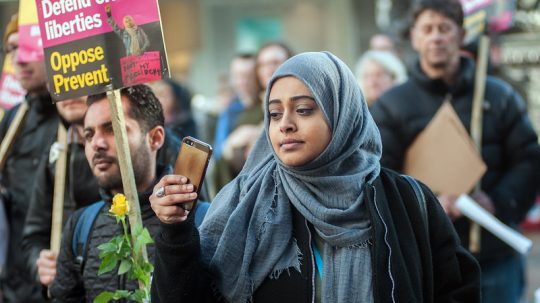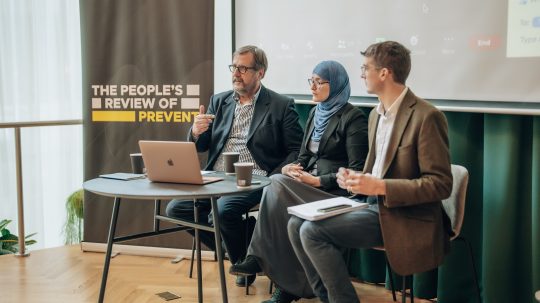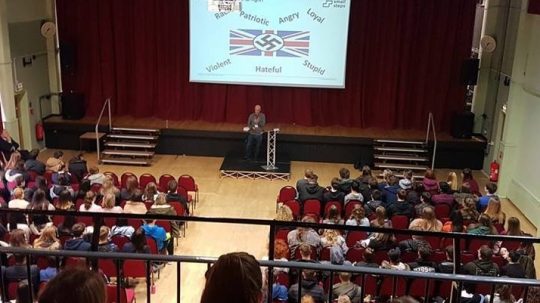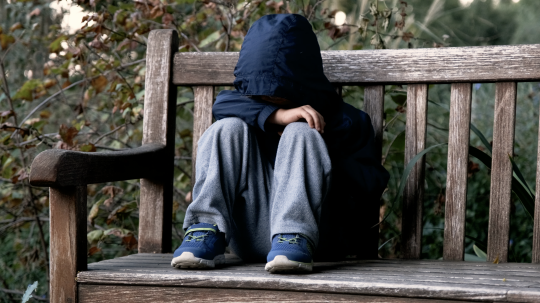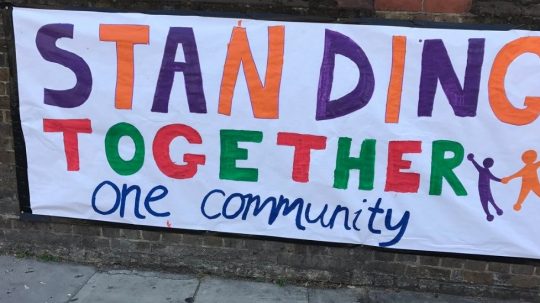
[Text on screen]: What is Prevent?
Shazad Amin: Prevent is part of the UK government's counterterrorism strategy, and it came around after the tragic 7/7 London bombings. But a significant change came about in 2015, when it was made a statutory duty for all public sector employees. So you know basically, we brought in social workers, teachers, doctors, university lecturers, etc. So suddenly the workplaces became potential areas for identifying people and children, as well, because don't forget this strategy bizarrely starts from nursery school onwards. So basically, the government says we need to kind of find these people before they become violent, yes? Essentially. So who are the people expressing extreme views? Now the problem with that, obviously you can see straight away, is that there is a very wide spectrum.
Rania Hafez :So I'm Rania Hafiz. I'm Senior Lecturer in Education at the University of Greenwich. I've been a teacher all my life for the past 28 years now. I think Prevent when it came to the fore, it started worrying quite a few of us teachers, and certainly my union, which is UCU, is quite concerned about the implications of Prevent. I've taught in Higher Education now for 15 years. But before that, I spent quite a number of years in Further Education. I've also been a governor at schools and in Further Education colleges. And increasingly, I started becoming aware of how Prevent was, it's fair to say, poisoning the relationship between tutors and students. But also it was targeting in particular particular groups of students, namely Muslim students. So that kind of concerned me as an educationalist, and also as a kind of practitioner, and a governor in colleges and schools.
[Text on screen]: FATIMA'S STORY
[Voiceover of Fatima]: My son was 11, when he joined this particular secondary school. It wasn't a school that I had put down as an option for him. It's well known in my locality for being an incredibly strict school that's almost modelled on the Victorian era, where children walk in single file in silence, they have corrections for getting things wrong. There's no three strikes and then a detention. It's an immediate half an hour detention after school. It's an incredibly strict school. The family broke down when he was four. And he had trouble, lots of emotional difficulty. He developed separation anxiety, he's had therapy, private therapy, and then support and therapy from his primary school. And I just knew, knowing my son's emotional makeup and what he's gone through, that this was not the right school for him. They're not known for being a nurturing supportive school, their focus is on behaviour and educational attainment. And I mean, I'm a teacher in a secondary school, and I'm all for educational attainment and enforced, you know, discipline in schools to some degree, because we need that. However, you have to look at the makeup and the background of that particular child. And not every child will thrive in a school like that. So I knew that but we didn't have any options. And off he went, got through the day, came home, and we had tears that first night. He just couldn't cope with their demands. He was just so unhappy. And the school just ignored that. They ignored it saying, "Give him time he'll settle, he'll settle" and just ignored what I was saying that he, you know, he has childhood trauma, he struggles in certain settings, and he's not settling. So it was a Tuesday and I picked my son up from school. He got into the car really quite upset and worried. He said, "I'm in trouble. The teachers took me out of lunch and questioned me and made me sign something". That just rang alarm bells. You don't question students and certainly don't take statements without at least having a parent informed and be invited in to support their child.
Rania Hafez: The policy categorises radicalization, signs of radicalization, as showing either vocal or active opposition to British values, to fundamental British values. Two of these British values are democracy and the rule of law. How these are interpreted, so if you actually question democracy, and you're a Muslim, are you showing a sign of being radicalised? The fact is, democracy is something we can debate and discuss and write lots of books about and it's not one thing or the other. The same thing with the rule of law.
I was a governor at the Sixth Form College and this particular Sixth Form College in East London has a majority Muslim student body. Ofsted arrives unannounced and proceeds to do a Prevent inspection and finds the college lacking. So when the college is trying to respond to that, one of the things that some of the tutors wanted to do was to put up posters about the rule of law, saying that the law teaches us right from wrong. And I had to point out as a governor that it wasn't that long ago when we had laws saying it was illegal to be gay. So the law is not something that teaches morality. The law is an outcome of current debates and values in society and the law can be an ass, and as we know, 100 years ago, women were fighting and losing their lives to get to break the law, which is the law that said they couldn't actually have a vote, and they wanted to change the law. So what I'm trying to say is that these so-called fundamental British values are not uncontested. And to actually then define radicalization, as anyone who even gives vocal opposition to this is also in one fell swoop, denying freedom of speech and freedom of thought. And as an educationalist I am completely wedded to freedom of thought and speech. This is the vocation of my life. So there are many, many aspects of Prevent that are problematic.
Fatima: The next day, I didn't send my son in. I sent them an email saying "You need to call me urgently, my son's really really worried, he's really anxious. Clearly, something's happened at school, but I have no idea what's going on". The truth is, there was a fire alarm practice. And in the context of this fire alarm, my son had said to his friend, "I hate this school so much, I hope it burns down". But that comment, you know, was passed on to one person and another person, then it's picked up by a teacher later on that same day, it kind of changed from "I hate the school so much, I hope it burns down" to, "I hate it so much I'm going to blow it up". The school was aware of these two different versions, they'd heard both from two different people. When they pulled him out of lunch that Tuesday, they started the interview with a very leading question. My son's scared, an 11-year-old boy with three adults, he just went along with the narrative and then signed what they asked him to sign at the end of that supposed interview.
So I got a phone call, and it was towards the end of that phone call when I could hear my own bell go in my school, and I was trying to wrap the conversation up. They said, "Oh, by the way, we've made a Prevent referral for what your son had supposedly said". The school missed my son's need, he needed support, and the school failed to give him that support. In fact, they failed to even recognise that need, because they were so hell-bent on "This is a brown Muslim boy, he must be a terrorist". He was profiled.
My son is now seen as a potential terrorist, any police officer could go look up his record, and it's going to be there, he will be prejudiced forever. And that's something that I have no control over. That's something I did not give permission for. My son hasn't committed a crime, you know, it was a cry for help. And the school handled it completely the wrong way. I work in a school, I know the procedure, and there is a clear issue with training in schools. This last year, our training was a 15-minute YouTube video, it was ridiculous. When you've got this limited, basic, almost non-existent training, given that something like this has such a significant impact on a child and a family's life. What does an individual fall back on? Well, they fall back on their own prejudices and views and interpretation of their world. And in the case of my son, they saw a young brown Muslim boy and made the referral on that.
Rania Hafez: So I think the problem with Prevent is not just the impact it has in the classroom or in schools and colleges and universities. The problem is, it's for everyone, it's not just for Muslims to actually stand up and say this policy is problematic. This policy is problematic for all of us as citizens because it is actually creating a them and us binary. It's also restricting freedom of speech and thought for everybody. It starts now with people of a Muslim faith, but that extends.
Shazad Amin: So the evidence shows, this is the government's own figures, and other people analyse them as well, that a British Muslim is eight times more likely to be referred to a Channel programme under Prevent. Now, you might say, well, what's the big deal about that, but that shows it's clearly discriminatory.
[Voiceover]: Channel is a practical component of the Prevent strategy, which the government claims provides early support to vulnerable people who are at risk of being drawn into terrorism, before they get involved with terrorist activity.
Shazad Amin: The most recent data up to 2019 showed that 90% of referrals to Channel were unwarranted, i.e. basically they were assessed, and they were found that they didn't have to go through the deradicalization programme, essentially. Yeah? There were other issues going on whether it’s health, education, whatever. Now 90% is a hell of a lot. Yes? If you had a drug licenced in the UK that only had a 10% success rate, what would you think about it? If the political will was there, the the actual research could be done to identify what are the risk factors that leads someone to committing a terrorist act? How can we better hone in on picking these people out? Rather than simply having this scattergun approach where you refer essentially, anyone you're a bit worried about. And that's what's happening.
[Voiceover]: There have been many criticisms and anxieties around Prevent, with many charities and organisations calling for it to be reviewed. In 2019, the government appointed Lord Alex Carlisle, a vocal advocate for the Prevent strategy, to conduct a review of it. Several of the human rights organisations that had originally called for the review argued that his appointment was unlawful due to his public support of the strategy. Later that year, he was relieved of his role on the review.
[Voiceover]: In 2021, the government announced the appointment of Sir William Shawcross to lead a new review of Prevent.
Shazad Amin: If Alex Carlise was bad, William Shawcross is quite frankly a ridiculous appointment. William Shawcross himself has a long history of Islamophobic comments, said things like "Europe and Islam is one of the greatest, most terrifying problems of our future". He also basically, then became chair of the Charity Commission, and waged a campaign of various attacks on various Muslim charities as that. He wrote a book where he made comments supporting torture in Guantanamo Bay.
And so there's lots of concerns about him. So basically, the bottom line is that, really when you are serious about doing the review, which disproportionately the evidence shows impacts on certain communities, it is imperative on the government to ensure that those communities have confidence in the review. So MEND along with you know, 16 other organisations have signed a statement expressing concern at Shawcross' appointment into leading this independent review. Because we believe his appointment shows us the government isn't serious about such a review. And his appointment really doesn't command the confidence in various communities including the Muslim community, and therefore he's not going to be able to do a robust independent review that has any meaning whatsoever.
[Voiceover]: The Prevent strategy puts at risk the rights and freedoms of people -particularly Muslims- across the UK. Innocent people like 'Fatima' and her son get swept up in the system and potentially tarred for life, because of poor training and ill-defined policies. It does need reviewing, but only by someone truly independent. Unless that happens, it seems clear that hundreds of faith and civil society organisations representing tens of thousands of people across the UK will have confidence in neither the government's strategy nor the process to review it.
[Credits]


